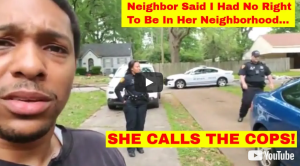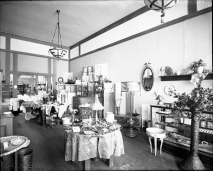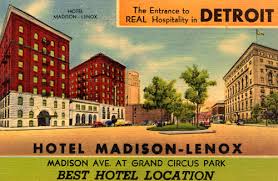I watched an hour-long program on MSNBC recently, “Everyday Racism in America.” Here’s the link if you did not see it. I urge you watch it, even before you read another word here. That tells you, I hope, how valuable I perceive this video to be.
 One reason I feel that way is that the concept of “everyday” racism is most likely difficult for many to grasp—many white folks, that is.
One reason I feel that way is that the concept of “everyday” racism is most likely difficult for many to grasp—many white folks, that is.
The stories told during the program were not just the dramatic ones we know from police shootings and other violence, but more about how ordinary human encounters with white people, police yes but also neighbors and fellow shoppers and many others, too often turn out to be painful and angering, if not dangerous, for the person or persons of color who are involved. This is part of their daily living, their everyday lives, in the United States of America. They have to live each day knowing, yes knowing, something ugly can, and probably will, happen.
 Sometimes, police or others get it right, as here in a news report about a young Black businessman in Memphis, Michael Hayes, but the initial action—a white woman calling police about the man at a boarded up house across the street, and continuing verbal outbursts even after the police verify his identity and his legitimate purpose in being in her neighborhood—is very common and at least painful and often dangerous for the person of color.
Sometimes, police or others get it right, as here in a news report about a young Black businessman in Memphis, Michael Hayes, but the initial action—a white woman calling police about the man at a boarded up house across the street, and continuing verbal outbursts even after the police verify his identity and his legitimate purpose in being in her neighborhood—is very common and at least painful and often dangerous for the person of color.
This story, and many from the MSNBC program, and others I read often in the media, have caused me to examine my own history of unconscious or inadvertent, or even intentional or at least obvious, racist behavior.
Recently, while walking our dog, I encountered a group of young Black men, and I was surprised to realize I felt some anxiety. I thought to myself, why do I feel this? They were a group of friends—hard to tell if there were high school or college students, perhaps both—who are enjoying joking and jiving. Then, my mind flashed back to an incident in Detroit from my childhood.

My father and I (age five or six) had driven into Detroit to pick up my aunt (my mother’s older sister) for Thanksgiving dinner at our home in Milford. She worked in the city during the winter months for a gift store (she also worked for them in the summer in a northern Michigan community when the store catered to the many tourists). When in Detroit she lived at a downtown hotel near the store (the picture below makes it look very glamorous).
He parked right in front of the hotel. I waited in the front seat—I think it was 1952 when I was six years old—while my father went up the steps to the hotel to collect my aunt. He was gone a short time.
But in that time, an older Black (we would have said Negro) man opened the rear hatch of our station wagon and started to climb in. I was startled; I am not sure I had time to feel much fear.
My father came out with my aunt, waved to me, and then saw what was happening. He left my aunt standing on the steps while he raced down yelling at the man to get out of the car. When my father got to the back of the car, the man climbed out, mumbling words I could not hear. He left, giving a slight bow to my father.

By now, my aunt had gotten to the car, and climbed in the back seat. My father sat in the driver’s seat. He asked me if I was okay. I said yes.
My aunt said, “Well, I’m not okay. That is outrageous” (I cannot remember her precise words, but these feel right). “That Negro (I don’t think she used the ugly “N-word” but I am not sure) needs to be arrested. Bob (speaking to my father), you should immediately call the police.”
“Well, Grace” (my aunt’s name), I am not going to do that. I think he meant no harm. It is bitter cold out and he had no coat or hat, only a thin shirt and pants. I think he was trying to get warm” (again, not my father’s precise words, but I think close).
“But,” continued my aunt, “Robin could have been killed. Don’t you care?”
“That’s enough,” my father said, his voice moving into a range I knew meant he was angry. “Of course, I care, and if Robin had been in real danger I would be doing that. In my judgment he was not at much risk. Besides, I don’t want this to create ugly feelings in Robin.”
My aunt started to speak again, but my father cut her off. “We will say no more about it, unless Robin has anything he wants to say.” I remained silent, as we all did the rest of the way home (an hour or so). I remember it was an uncomfortable ride.
Later, my mother asked me how I felt. She said Daddy had told her what happened. I told her I was okay. I don’t remembering acknowledging any fear or anxiety. She told me that neither she or my father would ever let me be harmed. I said I knew that.
I have thought of this over the years. It was my first encounter with a Black person (this is before we moved to the country and had Black neighbors (as I recounted in the previous post). How much has it affected my perceptions and reactions?
As I have acknowledged before, my father showed no signs of racist thinking or behavior (until I learned later about his ugly feelings toward Native Americans). In fact, his actions and comments in this incident are consistent with his voice on the subject of white attitudes toward Black people.
At the same time, however, he never engaged me in any dialogue on the subject, never sought to share one-on-one with me his own views and beliefs. He surely did not prepare me for a racist world.
And my aunt, who I cherished and who was in some ways like a second mother to me, was both a fearful woman and quite judgmental. Over the years, I heard her say some unpleasant things about others—not just Black people but others outside her circle.
 So, here I am, a 71-year-old white man (65 years later), feeling anxiety when I encounter a group of laughing young Black men who make space for me on the sidewalk as we pass, even some nodding at me and looking admiringly at our dog.
So, here I am, a 71-year-old white man (65 years later), feeling anxiety when I encounter a group of laughing young Black men who make space for me on the sidewalk as we pass, even some nodding at me and looking admiringly at our dog.
Will it never end?
And I know the answer, at least for me, is to get it out, admit my prejudices and fears, trace and uncover my history, “scrape off the paint they used to cover my senses” (as suggested by poet Alberto Caeiro in my previous post), in order to undo the damage done to me and to help others do the same. I expect there will be more paint to remove, and I pray I will do it whenever I see it.
What about you?
I repeat my invitation: Sharing these stories is a form of confession, without which repentance and reparations are impossible. I hope some readers will write here on the blog where comments are solicited. Whatever you share in this spirit I will approve for publication so others can see the comments too. If that is too much for you at this moment, feel free to write me personally at RevDrRobin@comcast.net

This moves me, Robin, as I recover from a visit with my birth family last weekend. My mom shared with my niece and nephew a story of how, as a toddler, I called adults in my family a gibberish word when I was angry. When asked what that word was, my language was not sufficient to explain. I was a tyke! Apparently the mystery was revealed in a grocery store when I pointed from the basket seat at a black man and used the made up name. The word was not a derivative of Negro, but was gutteral and clearly something I associated with someone who was bad.
My mom relates this story as a funny thing I did as a child. I hear it with it great pain for the obvious training to racism my little soul had already absorbed.
So came the activists age-old dilemma: what to say to young people when grandma is perpetuating racism and uncle is trying to break the cycle without breaking up the family. Overlay the dynamic that the reason for my visit is my brother’s serious illness, which is omnipresent in all our minds.
I hope my reaction and words were edifying, but I don’t know. I am always frustrated that I get so little time with individual family members and no real time to go deep on important topics. I try to remember that our role is to plant seeds and trust that Spirit will bring along others to water. But, never satisfied, I try to scatter as many seeds as peo Le will allow. Then one more.
Thank you, Harry, for this personal history, and present reality and hopes. I share your desire to sow as many seeds as possible. And I pray your brother can recover.